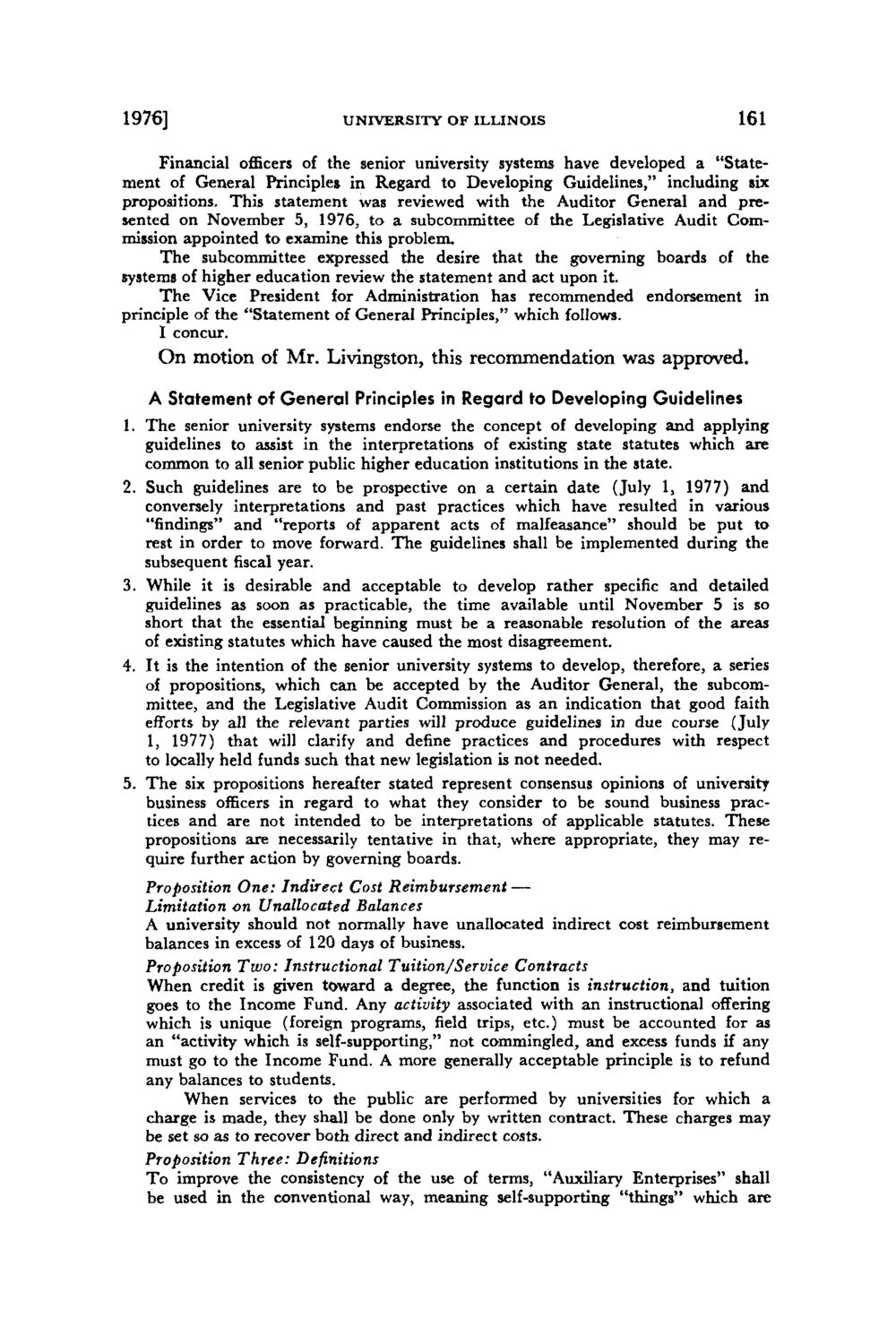| |
| |
Caption: Board of Trustees Minutes - 1978
This is a reduced-resolution page image for fast online browsing.

EXTRACTED TEXT FROM PAGE:
1976] UNIVERSITY OF ILLINOIS 161 Financial officers of the senior university systems have developed a "Statement of General Principle* in Regard to Developing Guidelines," including six propositions. This statement was reviewed with the Auditor General and presented on November 5, 1976, to a subcommittee of the Legislative Audit Commission appointed to examine this problem. The subcommittee expressed the desire that the governing boards of the systems of higher education review the statement and act upon it. T h e Vice President for Administration has recommended endorsement in principle of the "Statement of General Principles," which follows. 1 concur. On motion of Mr. Livingston, this recommendation was approved. A Statement of General Principles in Regard to Developing Guidelines 1. The senior university systems endorse the concept of developing and applying guidelines to assist in the interpretations of existing state statutes which are common to all senior public higher education institutions in the state. 2. Such guidelines are to be prospective on a certain date (July 1, 1977) and conversely interpretations and past practices which have resulted in various "findings" and "reports of apparent acts of malfeasance" should be put to rest in order to move forward. The guidelines shall be implemented during the subsequent fiscal year. 3. While it is desirable and acceptable to develop rather specific and detailed guidelines as soon as practicable, the time available until November 5 is so short that the essential beginning must be a reasonable resolution of the areas of existing statutes which have caused the most disagreement. 4. It is the intention of the senior university systems to develop, therefore, a series of propositions, which can be accepted by the Auditor General, the subcommittee, and the Legislative Audit Commission as an indication that good faith efforts by all the relevant parties will produce guidelines in due course (July 1, 1977) that will clarify and define practices and procedures with respect to locally held funds such that new legislation is not needed. 5. T h e six propositions hereafter stated represent consensus opinions of university business officers in regard to what they consider to be sound business practices and are not intended to be interpretations of applicable statutes. These propositions are necessarily tentative in that, where appropriate, they may require further action by governing boards. Proposition One: Indirect Cost Reimbursement — Limitation on Unallocated Balances A university should not normally have unallocated indirect cost reimbursement balances in excess of 120 days of business. Proposition Two: Instructional Tuition/Service Contracts When credit is given toward a degree, the function is instruction, and tuition goes to the Income Fund. Any activity associated with an instructional offering which is unique (foreign programs, field trips, etc.) must be accounted for as an "activity which is self-supporting," not commingled, and excess funds if any must go to the Income Fund. A more generally acceptable principle is to refund any balances to students. When services to the public are performed by universities for which a charge is made, they shall be done only by written contract. These charges may be set so as to recover both direct and indirect costs. Proposition Three: Definitions T o improve the consistency of the use of terms, "Auxiliary Enterprises" shall be used in the conventional way, meaning self-supporting "things" which are
| |